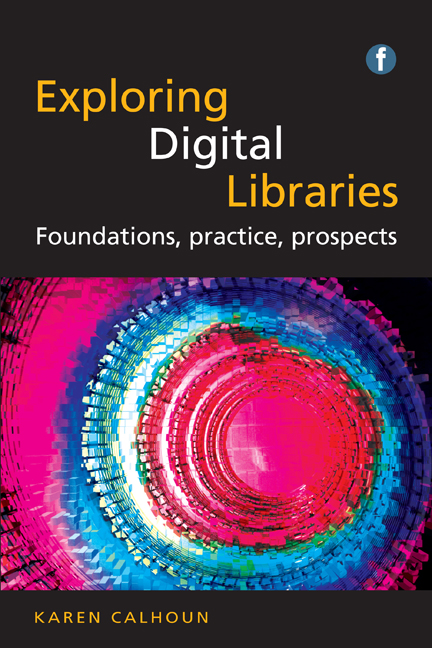Book contents
- Frontmatter
- Dedication
- Contents
- List of figures and tables
- Preface
- Acknowledgements
- Glossary
- 1 Emergence and definitions of digital libraries
- 2 Outcomes of digital libraries’ first decade
- 3 Key themes and challenges in digital libraries
- 4 Digital library collections: repositories
- 5 Hybrid libraries
- 6 Social roles of digital libraries
- 7 Digital libraries and their communities
- 8 The prospects of open access repositories
- 9 Digital libraries and the social web: scholarship
- 10 Digital libraries and the social web: collections and platforms
- References
- Index
3 - Key themes and challenges in digital libraries
Published online by Cambridge University Press: 08 June 2018
- Frontmatter
- Dedication
- Contents
- List of figures and tables
- Preface
- Acknowledgements
- Glossary
- 1 Emergence and definitions of digital libraries
- 2 Outcomes of digital libraries’ first decade
- 3 Key themes and challenges in digital libraries
- 4 Digital library collections: repositories
- 5 Hybrid libraries
- 6 Social roles of digital libraries
- 7 Digital libraries and their communities
- 8 The prospects of open access repositories
- 9 Digital libraries and the social web: scholarship
- 10 Digital libraries and the social web: collections and platforms
- References
- Index
Summary
Overview
This chapter provides a high-level view of the key themes, current position and challenges of digital libraries and their technologies, social aspects, collections and communities. It begins by identifying the key themes of the second decade (2002–12) of progress in the diverse, multidisciplinary, international field of digital libraries. A concept map visualizes the results of an analysis of second-decade digital library literature. The map provides new insights into this complex field by exposing thematic connections between technologies, collections, social forces and online community building. The chapter concludes with a consideration of key challenges facing digital libraries: interoperability, community engagement, intellectual property rights and sustainability.
The key themes of digital library work
Existing research to identify core topics
Jeffrey Pomerantz and colleagues (2006) produced a curriculum for digital library education that was aligned with the ‘5S framework’ for digital libraries discussed in Chapter 1 (see also Yang et al., 2009). They validated their selection of curriculum module topics by manually classifying papers from 1996 to 2005 from two sources: (1) 543 papers in the proceedings of two renowned digital library conferences; and (2) 502 articles published in D-Lib Magazine.
Their analysis revealed concentrations from both sources in digital library services, architecture and interoperability, and metadata. The conference papers revealed an additional concentration on the topic of digital objects. The D-Lib papers had additional concentrations around digital library collections, social issues and preservation.
Chern Li Liew (2009) provided a snapshot of the digital library literature from 1997 to 2007, focusing on articles about organizational and people issues. Liew was interested in digital libraries as ‘socio-technical systems’ that support not only information seeking and discovery but also community interaction and collaboration. The analysis drew from 577 articles on sociotechnical topics published in peer-reviewed library and information science journals, with some exceptions (e.g., D-Lib Magazine is not a refereed journal). The methodology appears to have excluded conference papers. The findings indicated first, a trend toward more articles on socio-technical topics over time and second, the dominance of topics related to digital library use and usability plus organizational, economic and legal issues. Ethical and social/cultural issues were not well represented in the Liew sample articles.
- Type
- Chapter
- Information
- Exploring Digital LibrariesFoundations, Practice, Prospects, pp. 59 - 84Publisher: FacetPrint publication year: 2014
- 1
- Cited by



